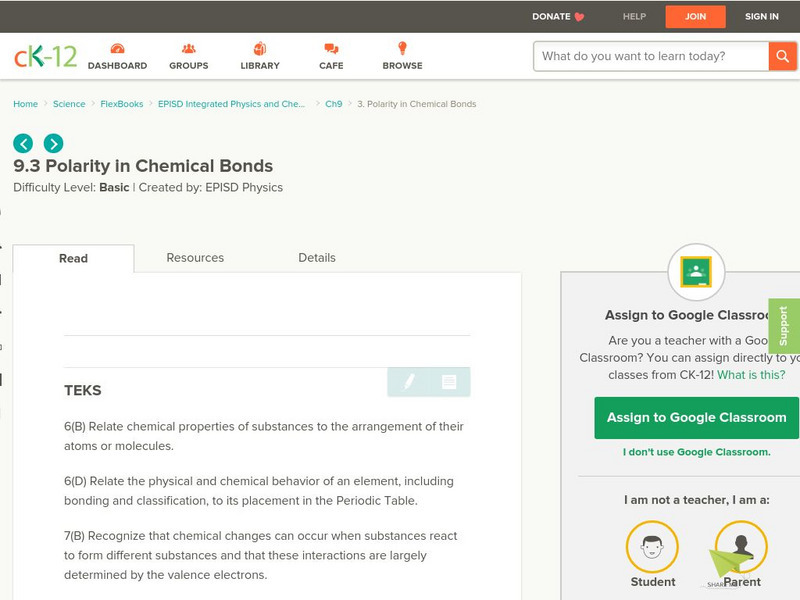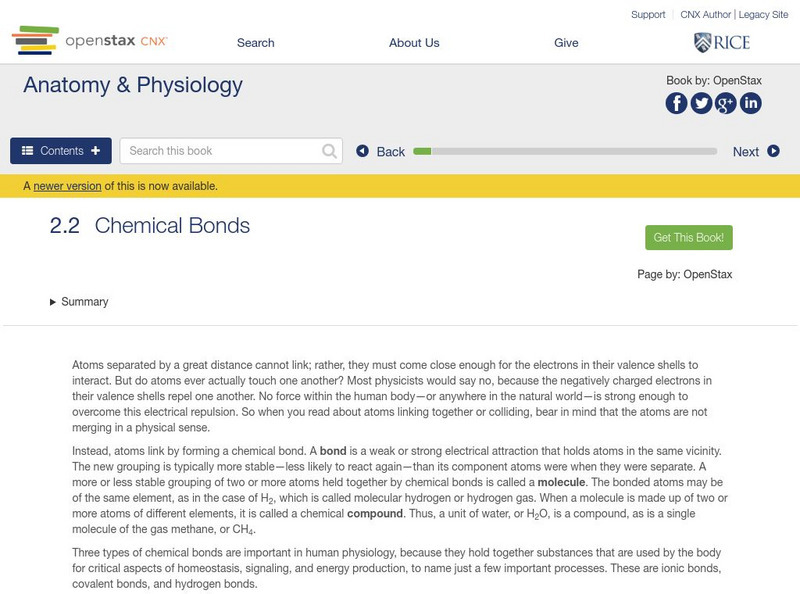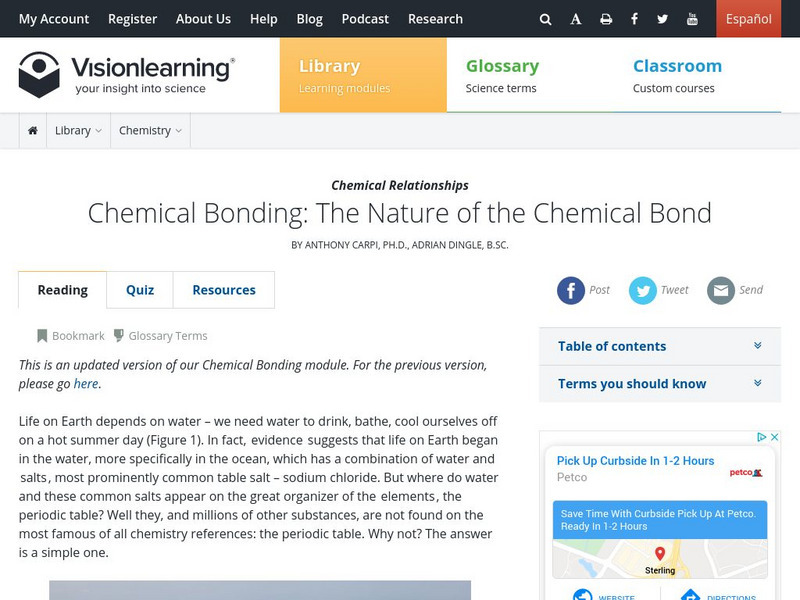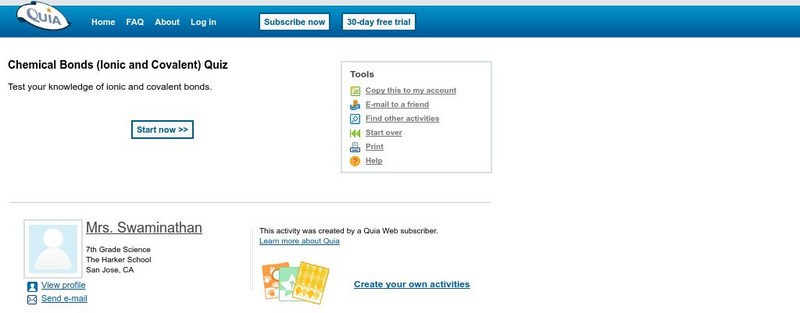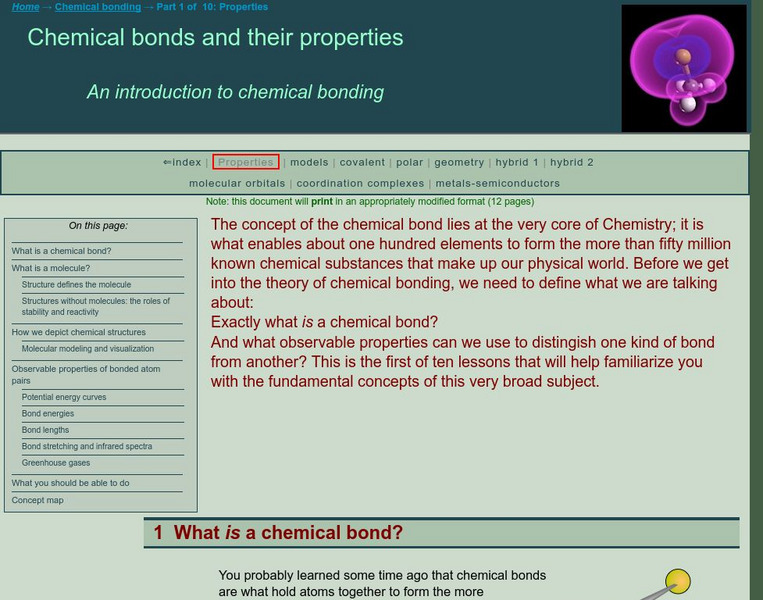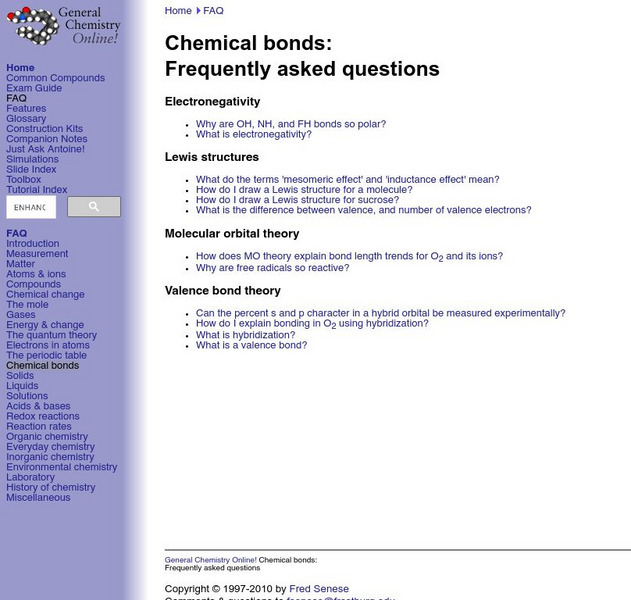PBS
Pbs Learning Media: Chemical Bonds
This interactive activity developed for Teachers' Domain demonstrates how attractive forces between atoms create chemical bonds, resulting in the formation of molecules and compounds.
Concord Consortium
Concord Consortium: Molecular Workbench Showcase: Chemistry, Chemical Bonds
Simulations to show students the nature of chemical bonds. Simulations include an explanation of stereochemistry, atomic orbitals, chemical polarity, formation of an atom, and a summary quiz.
CK-12 Foundation
Ck 12: Polarity in Chemical Bonds
[Free Registration/Login may be required to access all resource tools.] Students will determine the polarity of a chemical bond using the electronegativity chart, and then distinguish between nonpolar covalent, polar covalent, and ionic...
Khan Academy
Khan Academy: Biology: Chemistry of Life: Chemical Bonds
Review over covalent, hydrogen, and ionic bonding in this article. Learn how molecules are held together by chemical bonds.
OpenStax
Open Stax: Chemical Bonds
Learn here about chemical bonds, a weak or strong electrical attraction that holds atoms in the same vicinity.
Khan Academy
Khan Academy: Chemistry of Life: Skill Check: Chemical Bonds and Reactions
Use this skill check to test your understanding of chemical bonds and reactions.
Vision Learning
Visionlearning: Chemistry: The Nature of the Chemical Bond
This site talks about ionic, polar covalent, and non-polar covalent bonding.
Concord Consortium
Concord Consortium: Stem Resources: Chemical Bonds
By working through this web-based activity, students differentiate between ionic, non-polar covalent, and polar covalent bonds. Specifically, distinctions are made between bonding types based on orbital shapes and electronegativity...
Simon Fraser University
Chem1 Virtual Textbook: Models of Chemical Bonding: Why Do Chemical Bonds Form?
This extensive overview on chemical bonding seeks initially to answer the question, why do chemical bonds form? Information is provided on classical models of chemical bonding and quantum mechanical models of the chemical bond.
Simon Fraser University
Chem1 Virtual Textbook: Models of Chemical Bonding: Why Do Atoms Join Together?
The General Chemistry Virtual Textbook, or Chem 1, is broken into several sections covering various aspects of topics related to chemistry. This section deals with chemical bonds and seeks to answer the question, why do chemical bonds form?
Quia
Quia: Chemical Bonds (Ionic and Covalent) Quiz
This is 21-question multiple choice quiz over chemical bonds was written for a 7th-grade science class.
CK-12 Foundation
Ck 12: Earth Science: Chemical Bonding Study Guide
Understand chemical boding using this review guide.
Simon Fraser University
Chem1 Virtual Textbook: Chemical Bonds: Covalent or Ionic or What?
Use this resource to understand polar covalence in ion-derived solids.
Texas Education Agency
Texas Gateway: Chemical Bonding: Metallic Bonds
Given scenarios or diagrams, students will describe the nature of metallic bonding and explain properties such as thermal and electrical conductivity, malleability, and ductility of metals.
CK-12 Foundation
Ck 12: Physical Science: Chemical Bond
[Free Registration/Login may be required to access all resource tools.] Definition of a chemical bond, why they form and the different types.
CK-12 Foundation
Ck 12: Chemistry: Chemical Bond
[Free Registration/Login may be required to access all resource tools.] Definition of a chemical bond, why they form and the different types.
CK-12 Foundation
Ck 12: Earth Science: Chemical Bonding
[Free Registration/Login may be required to access all resource tools.] Examine the types of chemical bonding.
Simon Fraser University
Chem1 Virtual Textbook: Molecules and the Properties of Bonded Atoms
College-level site goes into great detail about chemical bonding properties, as far as energies, structure, angles, and length. Infrared absorption, the greenhouse effect, and global warming are addressed to exemplify bond length...
Texas Education Agency
Texas Gateway: Ionic and Covalent Bonding
In this tutorial, students learn about ionic and covalent bonds and predict which elements will form which type of bond. Includes interactive exercises as well as videos.
Frostburg State University
General Chemistry Online: Chemical Bonds Faq
Find answers to common questions about chemical bonds. Recognize molecular orbital theory and know how to draw a Lewis structure.
BBC
Bbc: Gcse Bitesize: Bonding: Covalent Bonds
This section of the lesson module focuses on covalent bonds, which are formed between non-metal atoms that share a pair of electrons. It includes links to a video and a test. Other types of chemical bonds are covered elsewhere in the...
Upper Canada District School Board
Tom Stretton's Advanced Placement Chemistry: Chemical Bonding
Take on this self-guided advanced level e-text, and learn about chemical bonding and molecular structure.
Crescent Public Schools
The Internet Science Room: Oxidation Numbers and Chemical Bonding
Through animated diagrams and illustrated examples, students can further their understanding of chemical bonds and oxidation numbers.
Other popular searches
- Chemical Bonding Lesson Plan
- Chemical Bonding Crossword
- Chemical Bonding Activity
- Edible Lab Chemical Bonding
- Chemistry Chemical Bonding
- Chemical Bonding Ionic
- Chemical Bonding Inquiry
- Worksheets Chemical Bonding
- Chemical Bonding Case Study
- Chemistry Chemical Bonding
- Matter and Chemical Bonding
- Science Chemical Bonding


